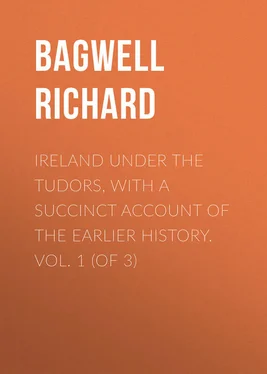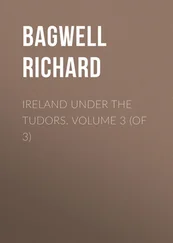Richard Bagwell - Ireland under the Tudors, with a Succinct Account of the Earlier History. Vol. 1 (of 3)
Здесь есть возможность читать онлайн «Richard Bagwell - Ireland under the Tudors, with a Succinct Account of the Earlier History. Vol. 1 (of 3)» — ознакомительный отрывок электронной книги совершенно бесплатно, а после прочтения отрывка купить полную версию. В некоторых случаях можно слушать аудио, скачать через торрент в формате fb2 и присутствует краткое содержание. Жанр: foreign_antique, foreign_prose, Историческая проза, на английском языке. Описание произведения, (предисловие) а так же отзывы посетителей доступны на портале библиотеки ЛибКат.
- Название:Ireland under the Tudors, with a Succinct Account of the Earlier History. Vol. 1 (of 3)
- Автор:
- Жанр:
- Год:неизвестен
- ISBN:нет данных
- Рейтинг книги:4 / 5. Голосов: 1
-
Избранное:Добавить в избранное
- Отзывы:
-
Ваша оценка:
- 80
- 1
- 2
- 3
- 4
- 5
Ireland under the Tudors, with a Succinct Account of the Earlier History. Vol. 1 (of 3): краткое содержание, описание и аннотация
Предлагаем к чтению аннотацию, описание, краткое содержание или предисловие (зависит от того, что написал сам автор книги «Ireland under the Tudors, with a Succinct Account of the Earlier History. Vol. 1 (of 3)»). Если вы не нашли необходимую информацию о книге — напишите в комментариях, мы постараемся отыскать её.
Ireland under the Tudors, with a Succinct Account of the Earlier History. Vol. 1 (of 3) — читать онлайн ознакомительный отрывок
Ниже представлен текст книги, разбитый по страницам. Система сохранения места последней прочитанной страницы, позволяет с удобством читать онлайн бесплатно книгу «Ireland under the Tudors, with a Succinct Account of the Earlier History. Vol. 1 (of 3)», без необходимости каждый раз заново искать на чём Вы остановились. Поставьте закладку, и сможете в любой момент перейти на страницу, на которой закончили чтение.
Интервал:
Закладка:
Besides the earldom of Ulster, Mortimer claimed enormous estates all over Ireland, but possession had been completely divorced from feudal ownership. He attacked the Wicklow clans, but was defeated with loss. In 1398 he made a final attempt to recover some portion of his Leinster inheritance, but was defeated and slain in Carlow by the O’Tooles, O’Nolans, and Kavanaghs. In the following year Richard again visited Ireland in person. His army was nearly as large as on the first occasion, and vast quantities of stores had been collected. The Crown jewels were carried with the King, as was a yet more precious flask of oil which had been transmitted straight from heaven to Archbishop Becket while praying at the shrine of Columba. But neither arms, nor gems, nor even the sacred chrism had any effect upon Art MacMurrough. The King again landed at Waterford, and after a few days’ rest moved forward to meet the redoubtable Irishman, who was posted in a wood with 3,000 men. An open space having been secured by burning houses and villages, Richard knighted young Henry of Lancaster, the future victor of Agincourt, and ordered a large number of labourers to fell the wood which sheltered the enemy. Aided by the ground, MacMurrough held the royal army in check for eleven days. The communications were cut, and the men at arms had nothing but green oats for their horses. It was early in July; but the weather was wet, and the whole army suffered from exposure and hunger. A convoy which arrived at Waterford rather added to the disaster. ‘Soldiers,’ says a contemporary chronicler, ‘rushed into the sea as if it were straw.’ Casks were broached, and more than 1,000 at a time were seen drunk with the Spanish wine. Abandoning the hope of attacking the Kavanaghs in their fastnesses, Richard made his way to Dublin, the Earl of Gloucester having failed to treat with MacMurrough.
The Leinster chieftain had married an Anglo-Norman heiress, and through her claimed the barony of Narragh in Kildare. He demanded to be put in full possession of his wife’s lands, and to be left unmolested to enjoy his chiefry. Otherwise he refused to come to any terms with the King. Richard threatened, but his Irish plans were interrupted by the news that Henry of Lancaster had landed in England. He lingered for some weeks in Ireland, and that delay was fatal to him. He reached Milford only to find that he had no longer a party, and thus Art MacMurrough may be said to have crowned the House of Lancaster. The Irish chief continued irreconcilable, and defied the Government until his death in 1417.
With a bad title and an insecure throne Henry IV. could not be expected to pay much attention to Ireland. The strength of the colony continued to decline during his reign. He made his second son, Thomas, Viceroy, but a child in his twelfth year was not the sort of governor required. The treasury was empty, and the young prince’s council had soon to announce that he had pawned his plate, and that not another penny could be borrowed. The soldiers had deserted, the household were about to disperse, and the country was so much impoverished that relief could scarcely be hoped for. The settlement was only preserved by paying black mail to the Irish. The towns defended themselves as they best could, and sometimes showed considerable martial enterprise. Thus Waterford was several times attacked by the O’Driscolls, a piratical clan in West Cork, who habitually allied themselves with the Le Poers. In 1413 the citizens assumed the offensive, and armed a ship, in which the mayor and bailiffs with a strong band sailed to Baltimore, where they arrived on Christmas Day. A messenger was sent to say that the Mayor of Waterford had brought a cargo of wine, and admission was thus gained to the chief’s hall. ‘The Mayor,’ we are told, ‘took up to dance O’Driscoll and his son, the prior of the Friary, O’Driscoll’s three brethren, his uncle, and his wife, and having them in their dance, the Mayor commanded every of his men to hold fast the said persons; and so, after singing a carol, came away bringing with them aboard the said ship the said O’Driscoll and his company, saying unto them they should go with him to Waterford to sing their carol and make merry that Christmas; and they being all aboard made sail presently, and arrived at Waterford, St. Stephen’s day at night, where with great joy received they were with lights.’
This exploit seems to have tamed the O’Driscolls for a time, but they invaded Waterford in 1452 and 1461. On the first occasion the citizens had the worst, but on the second they gained the victory, and took the chief with six of his sons. 37
In the first year of his reign Henry V. made the famous Sir John Talbot Viceroy. He was entitled to lands in Westmeath in right of his wife, and the lordship of Wexford had devolved upon his elder brother. He adopted the plan by which Bellingham and Sidney afterwards reconquered the greater part of Ireland. The array of the counties was called out under heavy penalties, and Talbot remained six days in Leix, which he so ravaged as to bring O’More to his senses. The bridge of Athy, which had been of use to none but the assailants of the Pale, was rebuilt and fortified, so that the cattle of loyal people might graze in safety, which they had not done for thirty years. Passes were cut in the woods bordering on the settled districts, and there seemed some hope for the shrunken and shattered colony. But Talbot’s salary of 4,000 marks fell into arrear, and his unpaid soldiers became a worse scourge than the Irish had been. The Viceroy and his brother, the Archbishop of Dublin, were constantly at daggers drawn with the White Earl of Ormonde, and the feud continued nearly till the Earl’s death in 1450. It was, however, due both to Sir John Talbot and to Ormonde, his antagonist, that the Irish were kept at bay. Shakespeare’s hero was the bugbear with which French mothers quieted naughty children, and he was no less feared in Ireland. With the colonists he was not popular, because the Crown refused him the means of paying his debts, and Irish writers stigmatise him as the worst man who had appeared in the world since the time of Herod.
‘France,’ says Sir John Davies, ‘was a fairer mark to shoot at than Ireland, and could better reward the conqueror.’ The latter part of his statement is questionable, but such was the view taken by the kings of England from Henry II. to Henry VII. Thomas Butler, Prior of Kilmainham, who ought to have been engaged in the defence of the Pale, took 1,500 men to help Henry V. at the siege of Rouen in 1418. The contemporary chronicler, Robert Redman, says they did excellent service with very sharp darts and crossbows. Trained in the irregular warfare of Ireland, they easily outran the Frenchmen, to whom they showed extraordinary animosity, but were less honourably distinguished by their practice of kidnapping children and selling them as slaves to the English. James, Earl of Ormonde and Wiltshire, also raised troops in Ireland for foreign service, and it is probable that many other contingents were furnished of which no record has been preserved. These forces consisted of Anglo-Irish, or at least of Irishmen settled in obedient districts, and their absence from home must have had a constant tendency to weaken the colony.
In 1449 Richard of York visited Ireland as Viceroy. He accepted the office for ten years, in consideration of 4,000 marks for the first, and 2,000 l. for each succeeding year, and of the whole local revenue. Richard was Earl of Ulster, but he preferred conciliation to any attempt at reconquest, and was, consequently, able to command the services of many Irish clans, including Magennis, MacArtane, MacMahon, and O’Reilly. The O’Byrnes were put down with the help of the Northern chiefs, O’Neill himself sent presents to the Duke, and most of the central districts became tributary. The Anglo-Normans of Munster, who had partially degenerated, renewed their allegiance, and it was generally supposed that the task of making Ireland English would at last be accomplished. The Viceroy’s son George, the ‘false, fleeting, perjured Clarence,’ of later years, was born in Dublin, and his sponsors were Ormonde and Desmond. But very soon the fair prospect was clouded. The stipulated salary was not paid. The Irish discovered that Richard had no greater force than his predecessors, and the MacGeohegans, who had submitted, openly defied his power. He left Ireland suddenly in the autumn of 1450, and did not return for nine years.
Читать дальшеИнтервал:
Закладка:
Похожие книги на «Ireland under the Tudors, with a Succinct Account of the Earlier History. Vol. 1 (of 3)»
Представляем Вашему вниманию похожие книги на «Ireland under the Tudors, with a Succinct Account of the Earlier History. Vol. 1 (of 3)» списком для выбора. Мы отобрали схожую по названию и смыслу литературу в надежде предоставить читателям больше вариантов отыскать новые, интересные, ещё непрочитанные произведения.
Обсуждение, отзывы о книге «Ireland under the Tudors, with a Succinct Account of the Earlier History. Vol. 1 (of 3)» и просто собственные мнения читателей. Оставьте ваши комментарии, напишите, что Вы думаете о произведении, его смысле или главных героях. Укажите что конкретно понравилось, а что нет, и почему Вы так считаете.












